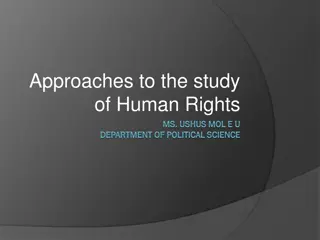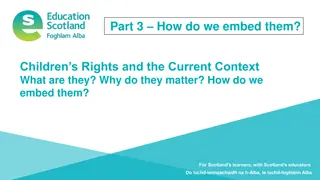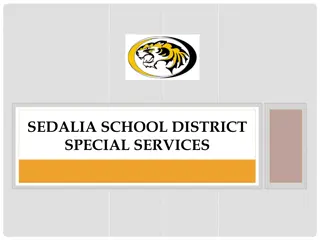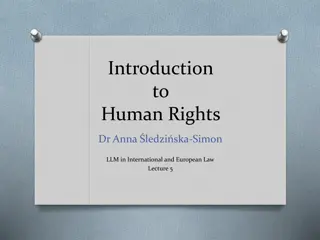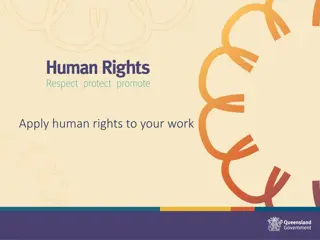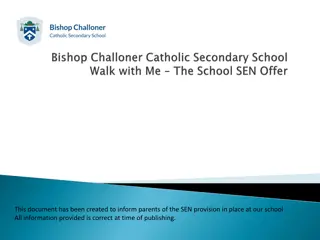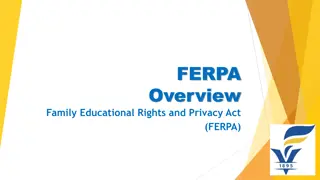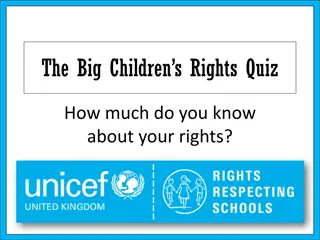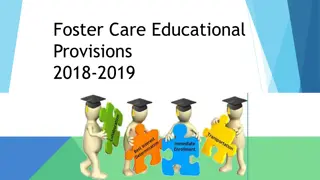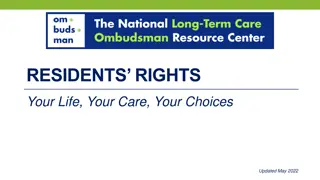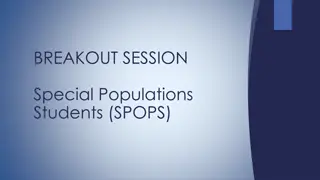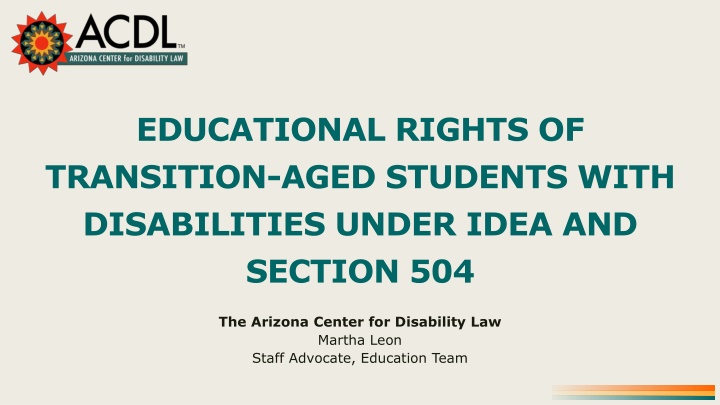
Educational Rights of Transition-Aged Students with Disabilities under IDEA and Section 504
Explore the educational rights of transition-aged students with disabilities under IDEA and Section 504 as outlined by The Arizona Center for Disability Law. Learn about the rights to free and appropriate public education, training information, the essence of special education, and where it originates from federal laws. Understand the entitlement to a Free Appropriate Public Education (FAPE) and the importance of personalized instruction and support services for students with disabilities.
Download Presentation

Please find below an Image/Link to download the presentation.
The content on the website is provided AS IS for your information and personal use only. It may not be sold, licensed, or shared on other websites without obtaining consent from the author. If you encounter any issues during the download, it is possible that the publisher has removed the file from their server.
You are allowed to download the files provided on this website for personal or commercial use, subject to the condition that they are used lawfully. All files are the property of their respective owners.
The content on the website is provided AS IS for your information and personal use only. It may not be sold, licensed, or shared on other websites without obtaining consent from the author.
E N D
Presentation Transcript
EDUCATIONAL RIGHTS OF TRANSITION-AGED STUDENTS WITH DISABILITIES UNDER IDEA AND SECTION 504 The Arizona Center for Disability Law Martha Leon Staff Advocate, Education Team
What is ACDL? Arizona s non-profit Protection & Advocacy agency Providing advocacy, information, referral services, community legal education and, in selected cases, legal representation to individuals with disabilities
Training Information The purpose of this training is to provide general information regarding the education rights of students with special needs. The information is provided in summary form and is not intended as a substitute to legal advice Federal and state law can change at any time, so please stay abreast of possible changes to the law
WHAT IS SPECIAL EDUCATION? 4
Where Does Special Education Come From? Two Federal Laws Individuals with Disabilities in Education Act (IDEA) Section 504 of the Rehabilitation Act 5
Right to a Free and Appropriate Public Education Under the Individuals with Disabilities Education Act (IDEA) and Arizona state law, IDEA-eligible students are entitled to a Free Appropriate Public Education (FAPE) from ages 3 to 21 (or to age 22, if their birthday occurs prior to the end of the school year), or until they earn a regular high school diploma. 20 U.S.C. 1412(a)(1)(A); 34 C.F.R. 300.102(a)(3)(i); A.R.S. 15-761(2)(a).
Free and Appropriate Public Education (FAPE) The right to a Free Appropriate Public Education (FAPE) is an educational entitlement of all students in the United States who are identified as having a disability, guaranteed by Section 504 and IDEA Board of Ed. of Hendrick Hudson Central School Dist., Westchester Cty. v. Rowley, 458 U.S. 176 (1982) FAPE does not mean an equal educational opportunity, it means personalized instruction with sufficient support services to permit the child to benefit educationally from that instruction. Endrew F. v. Douglas Cty. School Dist., 580 US _ (2017) FAPE is an educational program reasonably calculated to enable a child to make progress appropriate in light of the child s circumstances. 7
Legal Requirement Beginning not later than the year in which a student turns 16 years of age, a student s IEP must include appropriate measurable postsecondary goals based upon age-appropriate transition assessments related to training, education, employment, and the transition services (including courses of study) needed to assist the child in reaching those goals. 34 C.F.R. 300. 320(b)(1) and (2)
Transition Assessments How are transition goals/services determined? Through age- appropriate transition assessments. Informal Assessments Formal Assessments Informal interviews - Student, Parent, Teacher, etc. Interest inventories Situational assessments Person-centered planning notes Grades/Transcripts Achievement tests Intellectual functioning assessment Adaptive behavior scales Aptitude tests (Accuplacer/ASVAB) Temperament inventories Self-determination scales Pre-vocational/employability scales Personality & preference tests Career development measures
Transition Goals In the section of the IEP that addresses transition services, the IEP must include appropriate measurable postsecondary goals (MPGs) and the transition services necessary to assist the student in achieving these goals. Postsecondary goals should be realistic and should take into account and state what the student wants to do or achieve after high school. Goals can be in four areas: 1. Vocational training (e.g., learning a trade) 2. Postsecondary education (e.g., college or other schooling) 3. Jobs and employment 4. Independent living, if needed
Transition Goal Examples Appropriate MPG Example: After finishing high school, John will enroll in and attend a community college and pursue an associate s degree. While attending the community college, John will work part-time at a pet store. After graduating with his associate s degree, John will work full-time as a vet tech. Inappropriate MPG Example: After finishing high school, John will play for the NBA.
Transition Services Transition services can vary, but should support the achievement of the student s transition goals. Transition services might include: Instruction (including special education that is aligned to the achievement of transition goals) Related services (such as speech therapy, occupational therapy, and transportation services, all related to the student s transition goals) Community experiences, like volunteer work or an internship Career and college counseling Help with daily living skills, if needed
Transition Services Examples Appropriate Transition Services Examples: Employment Instruction in job applications and interview skills Enroll in Pre-employment Transition Services (Pre-ETS) (identify specific Pre-ETS service) Participate in a community-based work Education/Training Support the student to lead their transition IEP meeting Instruction in researching college majors and entrance requirements Plan out a pathway of interest with school counselor Independent Living Skills Instruction in budgeting skills Instruction and practice in obtaining a learner s permit Participate in community-based instruction to practice purchasing
Transition Services Examples Inappropriate Transition Services Examples: Employment Student will research jobs/get a job on their own (no school support) Education/Training Student will complete high school Living Skills Student will work with family on independent living skills (no school support)
Voc Rehab/Pre-ETS Vocational Rehabilitation (VR or Voc Rehab) VR is a free service through the Arizona Department of Economic Security. A program like it exists in every state. VR provides a variety of services to persons with disabilities, with the ultimate goal to prepare for, enter into, or retain employment. Pre-Employment Transition Services (Pre-ETS) Pre-ETS are specific career exploration and job readiness services that help students with disabilities prepare for future employment. Students with disabilities can receive Pre-ETS. Here in Arizona, a student with a disability is an individual who is between 14-22 years of age, participating in an educational program (e.g. public, private or charter schools, home school, vocational programs, college, GED programs, etc.), and has a documented disability (this includes students who qualify for a 504 plan or who have an Individualized Education Plan or IEP). It is important to note that these students do not have to apply for VR services or be clients of the VR program.
Voc Rehab/Pre-ETS, ctd. Intergovernmental Agreement There is an intergovernmental agreement between the Arizona Department of Education, VR (DES), and DDD (DES) to coordinate providing transition services to youth with disabilities. The IGA requires the three agencies to collaborate on providing services to eligible students, including information/records sharing, participating in the other agencies planning meetings, and coordinating services and goal-setting. Unfortunately, ACDL has seen many schools that are unfamiliar with VR and pre-ETS, and there is not a lot of outreach from VR to local schools at this time.
IEP Meeting Attendance Outside Agencies If a purpose of a child s IEP Team meeting will be the consideration of postsecondary goals for the child and the transition services needed to assist the child in reaching those goals, the [school], to the extent appropriate, and with parental consent, must invite a representative of any participating agency that is likely to be responsible for providing or paying for transition services to attend the child s IEP Team meeting. [34 C.F.R. 300.321(b)(1)and(3)] The Student Schools must invite a child with a disability to attend the child s IEP Team meeting if a purpose of the meeting will be the consideration of the postsecondary goals for the child and the transition services needed to assist the child in reaching those goals. [34 C.F.R. 300.321(b)(1)] The regulations that implement the IDEA state that students must be invited to attend their IEP meetings beginning not later than the first IEP to be in effect when the child turns 16, or younger if determined appropriate by the IEP team. [34 C.F.R. 300.322((b)(2)] If the child does not attend the IEP Team meeting, the public agency must take other steps to ensure that the child s preferences and interests are considered. [Id. at subsection (b)(2)]
Age of Majority/Transfer of Ed Rights When a student with a disability turns 18 years old, all rights previously held by their parent under IDEA and state law are transferred to the student, unless the student is under guardianship. If a student does not want to hold IDEA rights, they can execute a delegation of rights form to transfer IDEA rights back to their parent or other adult. Starting at or before age 17, the IEP team must provide notice to the student and parent about the transfer of rights described above.
GRADUATION 20
Right to a Free and Appropriate Public Education Under the Individuals with Disabilities Education Act (IDEA) and Arizona state law, IDEA-eligible students are entitled to a Free Appropriate Public Education (FAPE) from ages 3 to 21 (or to age 22, if their birthday occurs prior to the end of the school year), or until they earn a regular high school diploma. 20 U.S.C. 1412(a)(1)(A); 34 C.F.R. 300.102(a)(3)(i); A.R.S. 15-761(2)(a).
Graduation Once a student receives a regular high school diploma or ages out of special education, the school s obligation to continue providing FAPE ends. This means that when a student meets the requirements set by the Arizona State Board of Education and their school for the receipt of a regular high school diploma, or at the end of the school year during which the student turns 22 years old, the student will no longer receive services from their public school.
Graduation A regular diploma, as defined by the federal regulations implementing IDEA, is the standard high school diploma awarded to the preponderance of students in the State that is fully aligned with State standards, or a higher diploma, except that a regular high school diploma shall not be aligned to the alternate academic achievement standards described in section 1111(b)(1)(E) of the ESEA. 34 C.F.R. 300.102(a)(3)(iv). Not the same as a "certificate of completion" or "alternative diploma." A student can get something like that but still be entitled to FAPE because they haven't earned a regular high school diploma yet.
State Graduation Requirements to be Awarded a Regular Diploma In order to earn a regular high school diploma in Arizona, students must earn a minimum of 22 credits. The Arizona Administrative Code breaks down the credit requirements: Four credits of English or English as a Second Language; Three credits in social studies to include one credit of American history, including: Arizona history; one credit of world history/geography; one-half credit of American government, including Arizona government; and one-half credit of economics. Four credits of mathematics to minimally include Algebra 1, Geometry, Algebra 2 (or a personal curriculum), and a fourth course that contains high school content. Three credits of science in preparation for proficiency at the high school level on the statewide science assessment. One credit of fine arts or career and technical education and vocational education. Seven credits of additional courses prescribed by the local school district governing board or charter school. A.A.C. R7-2-302
All Students Must Be Held to the Same Standards Both the Elementary and Secondary Education Act (ESEA) and the Individuals with Disabilities Education Act (IDEA) require each state to apply the same challenging academic content and achievement standards to all schools and all students, including students with disabilities. 20 U.S.C. 6311(b)(1)(B); 34 C.F.R. 300.320(a)(2)(i). While modifications and accommodations must be provided to allow students with disabilities access to the general education curriculum and the same opportunities as their non-disabled peers, students with disabilities may not be held to different or lower standards as a result of their disabilities.
All Students Must Be Held to the Same Standards When local education agencies (LEAs) lower graduation requirements for students with disabilities, they may not be applying the same challenging academic content and achievement standards to all students, in violation of ESEA and IDEA. When LEAs award regular diplomas to students with disabilities prior to age 22 solely based on total credits earned in a substantially modified curriculum, they may be denying those students a FAPE. Holding students with disabilities to different and lower standards than those to which non-disabled students are held may further constitute discrimination on the basis of disability, in violation of Section 504 of the Rehabilitation Act of 1973
Federal and State Guidance Federal Guidance The United States Department of Education Office of Special Education and Rehabilitative Services (OSERS) issued guidance on this issue in 2014. The guidance states that apply[ing] different standards for promotion or graduation to students with disabilities will result in those students being taught to different and, potentially lower, standards than students without disabilities, thus depriving them of the same opportunities to learn that are available to their non-disabled peers. Letter to White, 63 IDELR 230 (OSERS 2014).
Federal and State Guidance Federal Guidance [I]f IEP Teams are permitted to set requirements for high school graduation that are not fully aligned with the State s academic content standards, LEAs will determine that students with disabilities who receive diplomas through the alternative pathway . . . are no longer entitled to FAPE. Such determinations would violate the requirement that a State and its LEAs ensure that FAPE is made available to all eligible students with disabilities in the State. Letter to White, 63 IDELR 230 (OSERS 2014).
Federal and State Guidance State Guidance: The Arizona Department of Education (ADE) finalized guidance in January 2020 on the topic of graduation for students in special education, accessible here: https://cms.azed.gov/home/GetDocumentFile?id=5d 49e65b1dcb2516ac6d1296 . This guidance cites to the federal guidance and reflects the same position.
Graduation Once the student graduates with a regular high school diploma or ages out, the school must complete a summary of the student s academic achievement and functional performance. This should include recommendations on how to assist the student in achieving his or her postsecondary goals. This summary should be provided to the student or the student s parents if the student has not reached the age of majority. Additionally, the school must provide Prior Written Notice to the eligible student or his or her parents documenting the change of placement.
Advocacy Tips If you do not believe your student has fulfilled all requirements for a regular high school diploma as described on the previous slide, but the school is still planning to award them a regular high school diploma and graduate them, consider: Requesting a copy of your student s transcript to review the courses they have completed; Requesting a copy of the school district s/charter s course catalogue to see course descriptions for the courses your child has completed and to determine whether they match the requirements for a regular diploma; Ask for work samples from the various classes your student has supposedly completed; Utilize the template letters ACDL has created (links on later slide); Utilizee IDEA dispute resolution options (links on later slide)
ACDL Blog Posts About Graduation Graduation of Students with Disabilities: https://www.azdisabilitylaw.org/graduation-of-students-with- disabilities/ Graduation of Students with Disabilities Graduation Requirements: https://www.azdisabilitylaw.org/graduation-of-students-with-disabilities-graduation-requirements/ Graduation of Students with Disabilities Transition Services: https://www.azdisabilitylaw.org/graduation-of-students-with-disabilities-transition-services/ Graduation of Students with Disabilities Common but Invalid Reasons Schools Give for Forcing Students with Disabilities to Graduate: https://www.azdisabilitylaw.org/graduation-of-students-with- disabilities-common-but-invalid-reasons-schools-give-for-forcing-students-with-disabilities-to- graduate/ Graduation of Students with Disabilities How Can I Ensure My Child Graduates in 4 Years?: https://www.azdisabilitylaw.org/graduation-of-students-with-disabilities-how-can-i-ensure-my-child- graduates-in-4-years/
Dispute Resolution Options The Arizona Department of Education (ADOE) Enforces the Individuals with Disabilities Education Act (IDEA) U.S. Department of Education, Office for Civil Rights Enforces Section 504 of the Rehabilitation Act of 1973 and Title II of the Americans with Disabilities Act (ADA) Due Process Hearing Evidentiary hearing before an Administrative Law Judge regarding IDEA
State Complaint Info Filing a State Complaint: https://www.azdisabilitylaw.org/wp- content/uploads/2019/12/Consejo-de-educaci%C3%B3n- especial-del-day17.pdf When to File a State Complaint: https://www.azdisabilitylaw.org/wp- content/uploads/2019/12/Consejo-de-educaci%C3%B3n- especial-del-day18.pdf
OCR Complaint Info Overview: https://www.azdisabilitylaw.org/wp- content/uploads/2019/12/Consejo-de-Educaci n-Especial-del- dia-day26.pdf Filing an OCR Complaint: https://www.azdisabilitylaw.org/wp- content/uploads/2019/12/Consejo-de-Educaci n-Especial-del- d a-day27.pdf Impartial 504 Hearing: https://www.azdisabilitylaw.org/wp- content/uploads/2019/12/Consejo-de-Educaci n-Especial-del- d a-day28-Secci n-504.pdf
Due Process Hearing Info More information about due process complaints is available at: http://www.azed.gov/disputeresolution/due-process-hearing/ Due process procedures can be found here: https://cms.azed.gov/home/GetDocumentFile?id=5b635a171dcb2509e41fe164 A model due process complaint form can be found here: https://cms.azed.gov/home/GetDocumentFile?id=5b6366441dcb2509e41fe181 When you file a due process complaint, something called Stay Put is automatically invoked. This rule means the student stays put in their current placement until the dispute at the center of the complaint is resolved. For students facing graduation, Stay Put can prevent a school from forcing a student to graduate and keep them enrolled until the due process hearing is over just make sure you file your due process complaint before the last day of school/graduation.
For More Information Arizona Center for Disability Law 5025 E. Washington St. Suite, 202 Phoenix, AZ 85034 602-274-6287 (voice / TTY) 1-800-927-2260 (toll free) www.azdisabilitylaw.org Arizona Department of Education 1535 West Jefferson Street Phoenix, Arizona 85007 602-542-5393 1-800-352-4558 www.azed.gov/special-education/ 37

